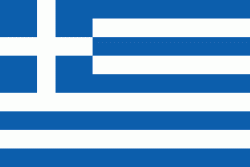Katerini (Kateríni)
 |
A popular tourist destination in northern Greece, Katerini is close to the sea (7 km) and to several archaeological sites of great interest such as the ancient city of Dion (5th century BC, 17 km away), the ancient Leivithra (27 km away),ancient Pydna (16km away) and the Castle of Platamon. The beaches of Korinos, Paralia and Olympiaki Akti (or Katerinoskala) are visited by both Greek and foreign tourists during the Summer. The base of Mount Olympus and the town of Litochoro, are at a distance of around 20 km from the centre of Katerini, whereas there is the Ski center of Elatochori in Mount Pieria at a distance of 33.4 km from the city's centre.
The origin of the name is obscure. Since the 13th century, travellers as well as maps record the existence of a settlement called Hatera (Ἅτηρα), which may have been the origin of the modern name. Thus Felix Beaujour recorded its name as "Katheri", while François Pouqueville gives the name of the settlement as "Kateri Hatera". According to another theory, the city derives its name from the small chapel dedicated to Saint Catherine (Aikaterini in Greek) to the east of the city, dating to at least the early 19th century. The latter hypothesis influenced official usage in Greek, where the city is found as "Aikaterini" or "Agia Aikaterini" until the early 20th century, when the vernacular name Katerini prevailed. According to the reports of travellers, at the turn of the 19th century, the city had four to five thousand inhabitants, mostly Greeks. In 1806, William Martin Leake recorded 100 hearths, while four years later Daniel recorded 140. For the remainder of the 19th century, the number of homes remained steady at about 300, with a population in 1900 of 2,070 Orthodox Christians and 600 Muslims.
The city was captured by the Greek 7th Infantry Division on 16 October 1912, during the First Balkan War, and has been part of Greece since then. With the population exchange between Greece and Turkey in 1923, the city's Muslims left, and Greek refugees, particularly from Eastern Thrace and Greek Evangelicals from Asia Minor, took their place, almost doubling the city's population from 5,540 in 1920 to 10,138 in 1928.
Map - Katerini (Kateríni)
Map
Country - Greece
 |
 |
| Flag of Greece | |
Greece is considered the cradle of Western civilization, being the birthplace of democracy, Western philosophy, Western literature, historiography, political science, major scientific and mathematical principles, theatre and the Olympic Games. From the eighth century BC, the Greeks were organised into various independent city-states, known as poleis (singular polis), which spanned the Mediterranean and the Black Sea. Philip II of Macedon united most of present-day Greece in the fourth century BC, with his son Alexander the Great rapidly conquering much of the ancient world, from the eastern Mediterranean to the North Western parts of India. The subsequent Hellenistic period saw the height of Greek culture and influence in antiquity. Greece was annexed by Rome in the second century BC, becoming an integral part of the Roman Empire and its continuation, the Byzantine Empire, which was culturally and linguistically predominantly Greek.
Currency / Language
| ISO | Currency | Symbol | Significant figures |
|---|---|---|---|
| EUR | Euro | € | 2 |
| ISO | Language |
|---|---|
| EN | English language |
| FR | French language |
| EL | Greek language |















